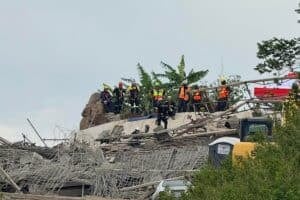Call them 'business forums' or the construction mafia: they disrupt infrastructure projects and this can affect economic growth.

Companies are getting used to construction-mafia violence by adapting to the often-violent ‘business forums’ holding the construction industry to ransom instead of putting plans in place to put a stop to the extortion.
These ‘business forums’ emerged in Umlazi in 2014 when groups started to invade construction sites, demanding a share of the project or that the company employs specific people or appoints certain companies.
By 2018 this practice, with construction-mafia members often wielding heavy calibre weapons, spread to other provinces. A similar model of extortion has since spread to other industries, most notably mining.
ALSO READ: Construction mafia incidents on the decline – Safcec CEO
Much of the violence in KwaZulu-Natal has subsided, Jenni Irish-Qhobosheane, a researcher at the Global Initiative Against Transnational Organised Crime, said in her keynote address at a recent Human Sciences Research Council event.
However, she said, this must not be taken as a sign that the extortion has stopped. It means that extortion has become normalised, a cost of doing business. And with the threat of violence always present, actual violence becomes less necessary.
Construction-mafia curbing economic growth
At the same event, Ayabonga Cawe, chief commissioner at the International Trade Administration, also pointed out that the extortion is compromising government’s vital infrastructure rollout, which in turn affects the whole economy.
He cautions that conflicts arise when there are different interpretations of what regulations mean. “The problem lies in how preferential procurement has unfolded and this opens up the way for opportunistic criminals.”
Irish-Qhobosheane agrees. “We must recognise that economic exclusion and a lack of economic transformation creates a fertile ground for extortion in construction. However, it is important to distinguish between genuine community concerns and criminals involved in extortion for their own gain.”
ALSO READ: Construction mafia creates crisis by derailing infrastructure projects
The ‘business forums’ usually demand 30% of the contract value for itself or its members. This figure apparently comes from National Treasury’s Preferential Procurement Policy Framework Act that provides for 30% of public procurement contracts going to designated groups, as provided for in the Preferential Procurement Regulations.
Sometimes the forums demand even bigger percentages, but the aim is always to give the demands a respectable veneer of transformation. National Treasury strongly condemned this practice as illegal and a blow to government’s attempts to advance the interests of historically disadvantaged individuals and SMMEs.
What is needed to stop construction-mafia?
Irish-Qhobosheane argues strong partnerships are the key to addressing the challenge and normalisation of extortion. Government must develop a comprehensive strategy to address systemic extortion and must include a more proactive response from the criminal justice system, while victims must feel safe enough to talk about and report extortion.
“The practice has become so prevalent that victims are not talking about it. They are scared to speak out because of the ever-present threat of violence and accommodate extortion practices by working it into the budget. Government, police, communities and local government must be involved in drafting a strategy to address these problems.”
Mohau Mphomela, executive director at MBA North, says that extortion must never be allowed to become routine: “Our industry has been battling severe headwinds for many years and this extortion continues to put vital contracts at risk.”
ALSO READ: Construction sector declines by 20% as a result of industry lawlessness
Musa Shangase, director at Corobrik, says construction companies and business in general must put in place comprehensive directives for dealing with extortion attempts.
“The first principle should be to afford the business forum the opportunity for dialogue and present their demands. I advise sharing with them the terms of the contract and what the obligations for advancing transformation goals are. They must be informed whether the project is a public or private one and what the implications are in each case.”
How community liaison officer can help
He also advises companies to request a database of the business forum’s constituents and employ a community liaison officer who can act as a mediator between the community and the company. The duties of the community liaison officer include negotiating, developing and fostering relationships and getting people to understand others’ points of view.
When it comes to public sector projects, the community liaison officer acts as the link between the main contractor and the business forum. In the case of private sector projects, Shangase says companies must report the matter to the police.
‘Business forums’ and their unreasonable demands are placing yet more strain on an industry that is already fragile. In so doing, they are not only affecting big companies, but in the process are closing the smaller, empowered companies that work alongside them.
Business Against Crime South Africa (BACSA) has, as part of the work of the National Priority Committee on Extortion and Violence at Economic Sites, compiled guidelines to help companies bring the extortion problem under control.






